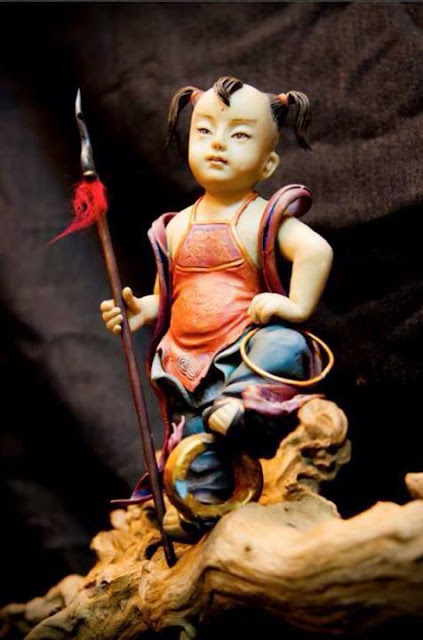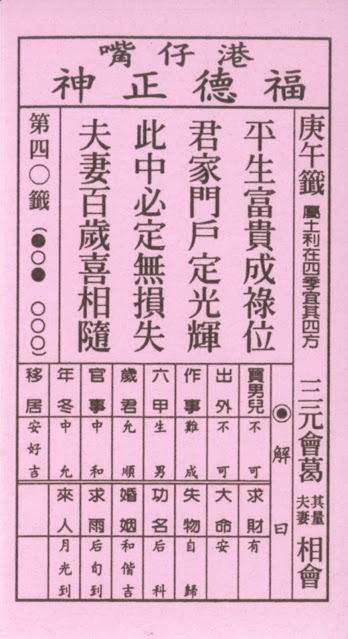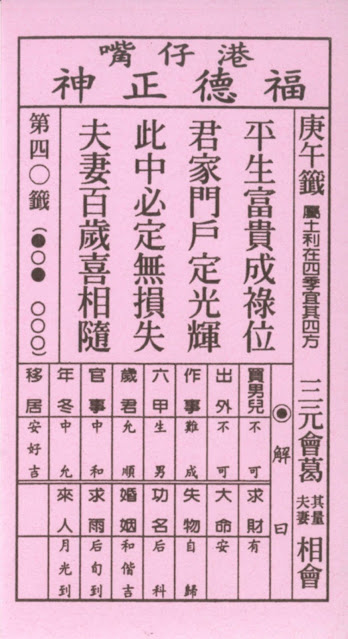中壇元帥 Marshal of the Central Altar
上圖來自網路,若有侵權,告知即刪
中壇元帥就是三太子哪吒(音同:挪乍)。不過哪吒是祂在民間故事中的名字,在宗教經典中則多稱其為那吒(發音相同)。
Marshal of the Central Altar is Third Lotus Prince Nezha. The writing of his Chinese name is different from that in folklore and religious books.
在中國,可追溯的相關資料,最早是編纂於宋代的《太平廣記》。這本書成書於西元978年,是一本經皇帝下令官方收集民間野史及小說雜著而成的書。合理推測三太子的民間傳說及相關信仰崇拜,於成書前即已廣為流傳。一般人印象深刻的《封神演義》及《西遊記》,則是十六世紀才有的創作。所以不應以此二書中所描述(尤其是《封神演義》中,關於祂「兒童時期」的劣蹟惡行),來認知這位天神。
In China, the traceable information is the earliest "Taiping Guangji" compiled in the Song Dynasty. This book was finished in 978 AD. It is a book that was ordered by the emperor to collect official folk histories and novels. It is reasonable to speculate that the folklore and related beliefs of the Third Lotus Prince had been widely circulated before the book was written. The "Investiture of the Gods (Feng Shen Yan Yi)" and "Journey to the West", which are impressive to most people, were created only in the 16th century. Therefore, we should not recognize this deity as described in the two books (especially his "childhood" evil deeds in the "Investiture of the Gods").
Marshal of the Central Altar is Third Lotus Prince Nezha. The writing of his Chinese name is different from that in folklore and religious books.
在中國,可追溯的相關資料,最早是編纂於宋代的《太平廣記》。這本書成書於西元978年,是一本經皇帝下令官方收集民間野史及小說雜著而成的書。合理推測三太子的民間傳說及相關信仰崇拜,於成書前即已廣為流傳。一般人印象深刻的《封神演義》及《西遊記》,則是十六世紀才有的創作。所以不應以此二書中所描述(尤其是《封神演義》中,關於祂「兒童時期」的劣蹟惡行),來認知這位天神。
In China, the traceable information is the earliest "Taiping Guangji" compiled in the Song Dynasty. This book was finished in 978 AD. It is a book that was ordered by the emperor to collect official folk histories and novels. It is reasonable to speculate that the folklore and related beliefs of the Third Lotus Prince had been widely circulated before the book was written. The "Investiture of the Gods (Feng Shen Yan Yi)" and "Journey to the West", which are impressive to most people, were created only in the 16th century. Therefore, we should not recognize this deity as described in the two books (especially his "childhood" evil deeds in the "Investiture of the Gods").
不論是「哪吒」還是「那吒」,這二個名字都和漢人命名時會使用的字非常不同。再由「三太子」這個稱呼來看,祂並非玉帝之子,下凡落胎的父親托塔天王也並非真的一國之王,何來三太子的尊稱呢?最合理的推測,是祂來自於非漢人文化圈。
Regardless of whether it is "Nezha (哪吒) " or "Nezha (那吒)," these two names are very different from the characters that Han people use when naming them. Judging from the title of "Third" Lotus "Prince", he is not the son of the Jade Emperor, and his father, Tota Heavenly King, who is down to earth, is not really the king of a country. How can he come from the honorary title of the Third Lotus Prince? The most reasonable guess is that he came from a non-Han cultural circle.
佛教約於西元一世紀由印度分南北二路傳入中國。佛教的典籍中記載:毗沙門天王(又稱多聞天王)的第三個兒子「那吒矩缽羅」,常捧著一個寶塔跟在天王身邊。若以此作為那吒的身世解,就合理回答了上一段的二個疑問。佛教傳入中國後,經過時間的催化,在都為多神教的先天條件下與儒家思想、中國神話及道教彼此融合,哪吒也就自然的融入民間信仰之中。(另有一說是那吒是毗沙門天王的孫子,此外那吒的名字也因翻譯的關係而有其他如:那吒俱伐羅、那羅鳩婆⋯⋯等稱呼)
Buddhism was divided into two routes from India in the first century AD, and it was introduced into China from the north and the south of China. According to Buddhist classics: The third son of King Bishamon (Sanskrit: Vaiśravaṇa) , Nalakuvara, often followed the King with a pagoda. If we use this as Nezha's life experience, we can reasonably answer the two questions in the previous paragraph. After Buddhism was introduced into China, it was catalyzed by time and merged with Confucianism, Chinese mythology, and Taoism under the innate conditions of all polytheism, and Nezha was naturally integrated into folk beliefs. There is another saying that Nezha is the grandson of King Bishamon. In addition, Nezha’s name has other different Chinese character arrangements due to translation, such as: 那吒俱伐羅, 那羅鳩婆... etc.
道教記載中,那吒是玉皇大帝手下的主要將領之一,統帥五營神兵,是戰神類的神祇,頭銜有太子元帥、中壇元帥、火輪天王、通天太師、威靈顯赫大將軍、三壇海會大神......等。民間一般尊稱太子爺、三太子。由於其外在形象為兒童,加上早期物質條件不佳,小孩成長不易,故台灣民間崇敬三太子的信仰香火旺盛,相信三太子會庇佑孩子順利長大。
According to Taoist records, Nazha was one of the main generals under the Jade Emperor. He commanded the five battalions of god soldiers and was a god of war. The titles were Prince Marshal, Central Altar Marshal, Fire Wheel Heavenly King, Tongtian Taishi ......etc. People generally honored as the prince and the third prince. Because the external image is a child, and the early material conditions are not good, children are not easy to grow up. Therefore, the belief of the third prince in Taiwan is very strong, and it is believed that the third prince will bless the children to grow up smoothly.
隨著時代的演進,台灣發展出具有在地特色的「電音三太子」表演。結合傳統民俗藝陣的「大仙翁仔(或作大仙尪仔)」及電子音樂,踩踏合於節奏的步法,常出現在廟會活動中。2019年更有甫從清華大學科技管理研究所畢業的邱怡澍,代表台灣赴日參加世界小姐選美,以三太子為元素,自行設計製作國服,驚艷國際舞台。(自由時報相關報導)
隨著時代的演進,台灣發展出具有在地特色的「電音三太子」表演。結合傳統民俗藝陣的「大仙翁仔(或作大仙尪仔)」及電子音樂,踩踏合於節奏的步法,常出現在廟會活動中。2019年更有甫從清華大學科技管理研究所畢業的邱怡澍,代表台灣赴日參加世界小姐選美,以三太子為元素,自行設計製作國服,驚艷國際舞台。(自由時報相關報導)
As the times evolve, Taiwan has developed "Electronic Music Three Princes" performances with local characteristics. Combining the traditional folk art array "Daxian Wengzai" and electronic music, stepping on rhythmic footwork, often appears in temple fairs. In 2019, Qiu Yishu, who just graduated from the Institute of Science and Technology Management of Tsinghua University, went to Japan to participate in the Miss World pageant on behalf of Taiwan. With the elements of the third prince, he designed and produced the national costume by himself, stunning the international stage. (Liberty Times related reports)
期待在多元文化的激盪下,中壇元帥的信仰可以再發展出更多令人讚嘆的特色創作。
It is hoped that under the agitation of multiculturalism, the faith of the Marshal Zhongtan can develop more amazing and unique creations.
期待在多元文化的激盪下,中壇元帥的信仰可以再發展出更多令人讚嘆的特色創作。
It is hoped that under the agitation of multiculturalism, the faith of the Marshal Zhongtan can develop more amazing and unique creations.
維基百科:哪吒
Wiki:Nezha




留言
張貼留言